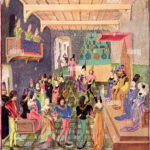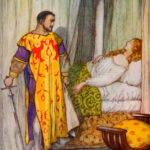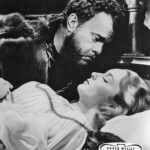Othello – The Greatest Tragedy by William Shakespeare
Introduction to the Play “Othello”
Othello is one of the greatest tragedies written by William Shakespeare, the pre-eminent English playwright and poet. It is believed to have been written in 1603 and was first performed by the King’s Men at the court of King James I on November 1, 1604. The first known publication of the play appeared in 1622 in a quarto edition by Thomas Walkley, followed by its inclusion in the First Folio of Shakespeare’s collected works in 1623.
Set in Venice and later in Cyprus, Othello revolves around the themes of jealousy, manipulation, race, betrayal, and identity. The central character, Othello, a Moorish general in the Venetian army, becomes tragically entangled in the schemes of his deceitful ensign, Iago. The play is renowned for its profound portrayal of psychological depth and emotional complexity, particularly in Othello’s relationship with his wife, Desdemona, and his descent into tragic madness.
About the Author:

William Shakespeare (1564–1616) was born in Stratford-upon-Avon, England, and is regarded as the most influential writer in the English language. He authored 39 plays (some in collaboration), 154 sonnets, and three long narrative poems. His works have been translated into every major language and performed more than those of any other playwright. Shakespeare’s plays, including Othello, continue to be celebrated for their timeless insight into the human condition.
Let us look into the summary of the play, Act-wise and Scene-wise. It will give us a clear picture and a better understanding of the play.
Act I
Scene 1:
The play begins on a street in Venice at night. Iago, upset over Othello appointing Cassio as lieutenant instead of him, conspires with Roderigo, who is in love with Desdemona. They decide to awaken her father, Brabantio, and tell him that she has eloped with Othello. Brabantio, enraged by the news, accuses Othello of using witchcraft to win his daughter.
Scene 2:
Iago pretends to be loyal to Othello and warns him about Brabantio’s anger. Othello remains calm, confident in his honorable status and his love for Desdemona. When Brabantio confronts them, Othello is summoned by the Duke to deal with an emergency in Cyprus. Brabantio follows, intending to press charges against Othello.
Scene 3:
At the council chamber, the Duke and senators discuss the Turkish threat to Cyprus. Brabantio accuses Othello of enchanting his daughter. Othello defends himself, narrating how Desdemona fell in love with him through his life stories. Desdemona confirms her passion, and the Duke allows the marriage. Othello is sent to Cyprus to command the defense. Iago tells Roderigo to come to Cyprus and promises to help him win Desdemona. Iago reveals in a soliloquy that he will use Othello’s trust against him.
Act II
Scene 1:
In Cyprus, a storm destroys the Turkish fleet. Cassio, Desdemona, and Iago arrive before Othello. Iago makes derogatory remarks about women and begins sowing the seeds of doubt in Desdemona’s loyalty, hinting that Cassio is too friendly with her. Othello arrives and lovingly reunites with Desdemona. Iago convinces Roderigo that Desdemona is falling for Cassio and that they must discredit Cassio.
Scene 2:
 A short scene where a herald announces a celebration for the victory over the Turks and Othello’s marriage ceremony with Desdemona. Everybody on the island is invited to the party.
A short scene where a herald announces a celebration for the victory over the Turks and Othello’s marriage ceremony with Desdemona. Everybody on the island is invited to the party.
Scene 3:
Iago gets Cassio drunk, knowing he cannot handle alcohol. Cassio, while intoxicated, gets into a fight with Roderigo and wounds Montano. Othello arrives and demotes Cassio. Cassio laments losing his reputation. Iago advises him to seek Desdemona’s help to get his position back, setting the stage for Othello’s jealousy.
Act III
Scene 1:
Cassio brings musicians to serenade Othello and sends a message through Emilia to speak with Desdemona. Emilia agrees to help Cassio meet her.
Scene 2:
Othello gives Iago some letters to deliver and discusses state business.
Scene 3:

This pivotal scene marks the turning point of the play. Desdemona promises Cassio she will help him. As she talks to Othello on Cassio’s behalf, Iago subtly points out how insistent she is. Othello becomes suspicious. Iago manipulates Othello into believing Desdemona is unfaithful, using her lost handkerchief (which Emilia gives him) as false proof. Othello becomes consumed by jealousy and vows revenge, promoting Iago to lieutenant.
Scene 4:
Desdemona is distressed that Othello is upset and has asked for the handkerchief, which she cannot find. Emilia suspects jealousy is troubling him. Cassio gives the handkerchief (which Iago planted in his room) to Bianca, a courtesan, asking her to copy its embroidery.
Act IV
Scene 1:
Othello, now deeply influenced by Iago, experiences a fit of jealousy. Iago stages a conversation with Cassio about Bianca, but makes Othello think they are talking about Desdemona. Bianca arrives with the handkerchief, confirming Othello’s suspicions. Enraged, Othello plans Desdemona’s murder. Lodovico arrives from Venice and witnesses Othello strike Desdemona, shocked at his behavior.
Scene 2:
Othello questions Emilia, who swears Desdemona is innocent. Desdemona remains confused by Othello’s anger. Othello calls her a “whore” and leaves. Emilia suspects someone has poisoned Othello’s mind. Iago pretends ignorance. Roderigo expresses his frustration, and Iago convinces him to attack Cassio.
Scene 3:
Desdemona prepares for bed and sings the Willow Song, a haunting tune of lost love. She speaks innocently of her devotion, unaware of her fate. Emilia subtly criticizes gender injustice, offering early feminist insight.
Act V
Scene 1:
Iago instructs Roderigo to attack Cassio. The attempt fails—Cassio wounds Roderigo and is himself wounded by Iago (disguised). Iago pretends to be helping and kills Roderigo to silence him. Othello, hearing of Cassio’s supposed death, goes to kill Desdemona.

Scene 2:
Othello: ‘When he saw her asleep, Othello thought he would not shed her blood, nor scar that white skin of hers, whiter than alabaster’. Othello confronts Desdemona in her bed. Despite her pleas, he smothers/kills her. Emilia enters and reveals the truth about Iago’s treachery and the handkerchief. Realizing his terrible mistake, Othello is devastated. Iago kills Emilia and flees, but is captured. Othello delivers a tragic speech, then stabs himself and dies beside Desdemona. Cassio is appointed the new governor, and Iago is arrested for punishment.
Detailed character sketch of the Major Characters in Othello by William Shakespeare:
Othello – The Moor of Venice
-
Role: Protagonist; a noble and respected general in the Venetian army.
-
Traits: Brave, eloquent, dignified, but emotionally vulnerable.
-
Character Arc: Othello is a black man in a white-dominated society, and though he is deeply respected for his military service, he remains an outsider. His love for Desdemona is deep, but his trust in Iago over her leads to jealousy, insecurity, and ultimately tragedy. His downfall is caused not by inherent evil but by manipulation and a fatal flaw: his trusting nature.
-
Famous Lines: “She loved me for the dangers I had passed, and I loved her that she did pity them.”
2. Iago – The Villain and Manipulator
-
Role: Othello’s ensign; the antagonist of the play.
-
Traits: Deceptive, cunning, manipulative, bitter, and amoral.
-
Character Arc: Iago is driven by jealousy (for Cassio’s promotion and possibly for Othello’s supposed affair with his wife Emilia) and pure malice. He orchestrates Othello’s tragic downfall by manipulating almost every character in the play.
-
Famous Lines: “I am not what I am.”
3. Desdemona – Othello’s Wife

-
Role: Daughter of Brabantio and the innocent, virtuous wife of Othello.
-
Traits: Loyal, strong-willed, pure, and gentle.
-
Character Arc: Defies her father by marrying Othello. Despite societal norms, she shows strength and independence. She is falsely accused of infidelity and becomes a tragic victim of Othello’s jealousy and Iago’s plot.
-
Famous Lines: “I do perceive here a divided duty.”
4. Cassio – Othello’s Lieutenant

-
Role: A handsome and educated soldier, promoted by Othello.
-
Traits: Honest, courteous, gallant, but naïve.
-
Character Arc: Iago resents Cassio for being promoted over him and targets him in his schemes. Cassio’s good looks and charm make him an easy scapegoat in the affair accusation.
-
Famous Lines: “Reputation, reputation, reputation! O, I have lost my reputation!”
5. Emilia – Iago’s Wife and Desdemona’s Maid
-
Role: A sharp-witted and perceptive woman.
-
Traits: Bold, cynical, loyal to Desdemona, morally awakened.
-
Character Arc: Initially compliant to her husband, Emilia eventually reveals Iago’s treachery. Her moral courage shines when she exposes the truth, even though it costs her life.
-
Famous Lines: “Let husbands know their wives have sense like them.”
6. Brabantio – Desdemona’s Father
-
Role: A Venetian senator.
-
Traits: Proud, authoritative, racist.
-
Character Arc: Feels betrayed by his daughter’s marriage to Othello. His reaction reflects the racial prejudices of society. He dies heartbroken, possibly from the shame and grief.
-
Famous Lines: “Look to her, Moor, if thou hast eyes to see; she has deceived her father, and may thee.”
7. Roderigo – A Foolish Suitor of Desdemona
-
Role: A wealthy and gullible nobleman.
-
Traits: Jealous, desperate, easily manipulated.
-
Character Arc: Roderigo is infatuated with Desdemona and becomes Iago’s pawn. He finances Iago’s schemes, hoping to win Desdemona, but is eventually betrayed and killed by Iago.
-
Famous Lines: “I will incontinently drown myself.”
8. Duke of Venice
-
Role: The ruling authority in Venice.
-
Traits: Just, diplomatic, rational.
-
Character Arc: He supports Othello in the beginning and sends him to Cyprus. Acts as a symbol of state justice and authority.
-
Famous Lines: “Your son-in-law is far more fair than black.”
Themes Highlighted in the Play:
-
Jealousy: Othello’s tragic flaw, which results in his downfall, is driven by Iago’s manipulation.
-
Deception: Central to Iago’s character; he masks evil with false loyalty.
-
Race and Otherness: Othello’s identity as a Moor is a constant source of insecurity, as he is humiliated multiple times.
-
Gender and Power: Desdemona’s innocence is destroyed by a patriarchal system; Emilia becomes a voice of truth.
-
Reputation and Honor: From Cassio’s “reputation” to Othello’s sense of betrayal, these drive key decisions.
Conclusion:
William Shakespeare’s Othello concludes as a powerful tragedy of love, jealousy, and betrayal, revealing the devastating effects of manipulation and mistrust. Othello’s transformation—from a noble, respected general to a man consumed by irrational jealousy—demonstrates the fragility of human nature when confronted with deceit and insecurity. The climax scene, in which Othello kills Desdemona, believing her unfaithful, exposes the tragic consequences of misplaced trust in Iago, whose villainy drives the entire plot.
Read More:
Toni Morrison’s Beloved STUDY ENGLISH LITERATURE
The Grass Is Singing STUDY ENGLISH LITERATURE
40+ MCQS – Elaine Showalter: Towards a Feminist Poetics STUDY ENGLISH LITERATURE
